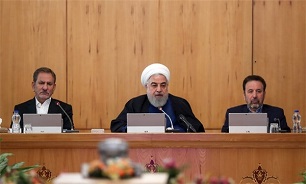Iran Blasts FATF’s Politically-Tainted Decision
 The government released the statement during the cabinet session on Wednesday after the global money-laundering watchdog’s decision to blacklist Iran.
The government released the statement during the cabinet session on Wednesday after the global money-laundering watchdog’s decision to blacklist Iran.
“Undoubtedly, putting Iran's name on the list of non-cooperating countries (blacklisted), both during the 10th government and during this period, has been politically motivated" by some of Iran's enemies, the stamen said.
“Iran's anti-terrorism policy is based on the peaceful and justice-seeking nature of the Islamic Republic of Iran, and is being implemented in all areas, including the fight against financing terrorism.”
“It is our motive for pursuing all measures against money laundering and financing terrorism is what our people want and what our internal laws and regulations have been following in different periods,” it added.
“On this basis, we have also welcomed the cooperation with other countries in this field and have agreed to comply with the internationally accepted laws and standards that are in line with our domestic laws and regulations,” said the government.
The statement assures that “since Iran has always believed in combating money laundering and financing of terrorism, the cooperation with FATF has been on the country’s agenda since the beginning of the 10th government by the pursuit of the Supreme National Security Council and the Ministry of Economic Affairs and Finance”.
Noting that the current government has been actively involved in the international body’s affairs and has taken steps to counter the money laundering and financing of terrorism, the statement said, such measures, in a period, “led to the change of Iran's status and gaining a two-year opportunity for International engagement.”
The Iranian Foreign Ministry also rapped the decision by FATF on Tuesday, saying that blacklisting is part of the US, Israeli and Saudi political ploys in international mechanisms.
Experts say it’s against international law for FATF to lift the suspension of counter-measures and call on its members or urge all jurisdictions to apply effective counter-measures against Iran.
According to FATF, Iran will remain on the FATF statement on High Risk Jurisdictions Subject to a Call for Action until the full Action Plan has been completed.
The FATF in October extended suspension of its measures against Iran, giving the country four more months until February 2020 to comply with requested recommendations.
“If before February 2020, Iran does not enact the Palermo and Terrorist Financing Conventions in line with the FATF Standards, then the FATF will fully lift the suspension of counter-measures and call on its members and urge all jurisdictions to apply effective counter-measures, in line with recommendation 19,” the FATF said in a statement.
Iran has been required to fulfill dozens of FATF recommendations to enhance its status from a blacklist of non-cooperative countries, while the country is under US sanctions. The country's status in FATF has no impact on toughening or easing the US sanctions.
FATF has required Iran to implement a number of moves that include endorsement of several conventions.
Palermo bill is one of the four government bills seeking to bring Iran's anti-money laundering and countering terrorism financing standards into line with those defined by the FATF.
The parliament has approved all the measures but except for the bill that updates Iran's domestic law on countering financing of terrorism. All the rest have been rejected by the Guardian Council – a watchdog that ensures laws are in line with the Constitution and Sharia.
The bills on Iran’s accession to the Palermo Convention and the convention against the funding of terrorism (CFT) were rejected by the Guardian Council in early November due to some flaws that violated the country’s Constitution. The bills were then amended by the Iranian Parliament, waiting for the next steps in the Guardian Council.
To fulfill FATF requirements, President Hassan Rouhani’s administration has proposed four bills to the parliament for approval, two of which are still undecided, including the Palermo Convention. They have been referred to the Expediency Council for final approval.
Yet, Iran has recently approved a national anti-money laundering (AML), which was a domestically-developed bill.
In its October meeting, the FATF decided to extend the deadline for Iran until February to complete reforms under the specified action plan that includes a list of 9 major moves, including the opening of its financial transactions data bank to the FATF that is headed by the US Department of the Treasury’s Assistant Secretary heading the Office of Terrorist Financing and Financial Crimes Marshall Billingslea.
The Political-Defense-Security and Legal-Judicial Commissions of the EC declared last January that endorsement of the Palermo bill would run against the country's interests.
Message end/
